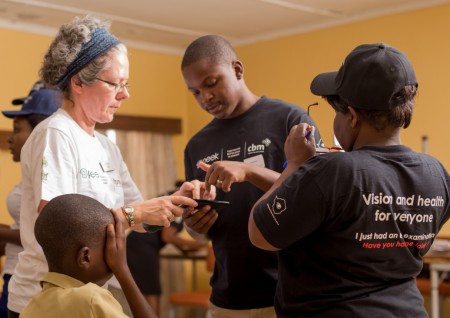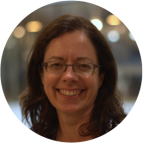
Karen Sparrow (left) working with a team of people as part of a school screening programme in Zimbabwe.
Credit: Council For The Blind Zimbabwe
I’ve been an optometrist for all of my working life and got into training at a very early stage. I’ve also always had a passion for travelling and got actively involved with Vision Aid Overseas in 2007. My work with them has involved leading teams to various countries in Africa to train local staff and support the strengthening of their eye health systems. So I’ve always had an interest in helping other people and helping spread the skills of eye health and optometry.
That inspired me to do a Masters degree in Public Health for Eye Care at the London School of Hygiene & Tropical Medicine in 2015-16. Through this and my Vision Aid Overseas work I was introduced to Peek, which was establishing itself as an independent organisation in late 2016. So I was delighted to join Peek when I finished my Masters in September 2016 – I was one of a very small team at that time that has now more than quadrupled in size.
In the early days, because Peek was such a tiny team, I was doing everything under the sun, as well as training! But now, with a larger team and support from our partners, I’m fully focused on supporting the teams using Peek in different locations to deliver the training that’s needed for our partners to run their programmes.
My work doesn’t focus on training eye health teams on how to use Peek solutions, but rather how to train their own people to use them. They can then use Peek solutions to build on and strengthen the programmes and systems they already have.
A recent highlight for me has been supporting the launch of the Peek programme in Zimbabwe, led by Council for the Blind Zimbabwe and supported by Peek’s partners CBM International. In May 2019 we visited Bulawayo, the second city in Zimbabwe, following an earlier visit this year to the capital Harare. Our aim was to train around 30 people to be able to implement their school eye health programme. We ran a training workshop for three days and then visited two schools to field test their skills, and we were really happy with the outcome. In both of the workshops we’ve run in Zimbabwe so far, everybody is so dedicated and committed that it is a pleasure to train them.
In Zimbabwe and many of the other projects I’ve worked on, there is a great enthusiasm for eye health, particularly school eye health, which is so important. There’s an understandable perception that if we can help the children then they will have a good education and that will set them up for life.
There is also a great enthusiasm to use technology to make that process more effective, easier, faster and collect better data to be able to know that you’ve actually made an impact when you’re running a programme. A number of the more senior people that we’ve trained have experienced programmes like this before but they’ve had to write everything down on paper, and then the paper has to get transported somewhere else to be entered on to a computer, so they don’t find out how it’s going until days or weeks later. So there’s a massive enthusiasm for being able to use technology to make our lives easier but also to make eye health programmes more effective.
I have probably attended thousands of child and adult eye health screenings in the last decade or so, either doing the examinations or screenings or coordinating. It’s always a joy to see how kids react to being screened. We do a briefing for each class as to what to expect so they know how to do the test – in my recent trip to Bulawayo they all caught on extremely quickly and were incredibly well-behaved. They were fascinated by the process, and like any school kids, they got to come out of class so that was a huge excitement!
For me, the best part of our training trips is presenting the certificates to the trainees when the training and field tests are complete. Inevitably, it’s always a little chaotic at the start as people find their way with the new technology, but the beauty of it is that on the last day you can just stand back and watch the local team do it all brilliantly. To see how pleased everybody is and how happy they are to have got to that point is amazing.
The most important thing I’ve learned in my career is that no matter how hard you work, you’re only in another country for a very short period of time. You spend more time in your home country, wherever that is, than you do anywhere else. So you need to do things that will enable people to do more, be more effective, and help more people. Ultimately, what motivates me is giving eye health professionals the skills and the confidence to do that year-round, because we’re only there for a week or two.

About the author: Karen oversees global programme training and development for new programmes at Peek, building up knowledge in the field and translating it to enable successful and sustainable implementation and scale up. A trained optometrist, Karen is also an alumnus of LSHTM, a fellow of the American Academy of Optometry and a member of the World Council of Optometry.